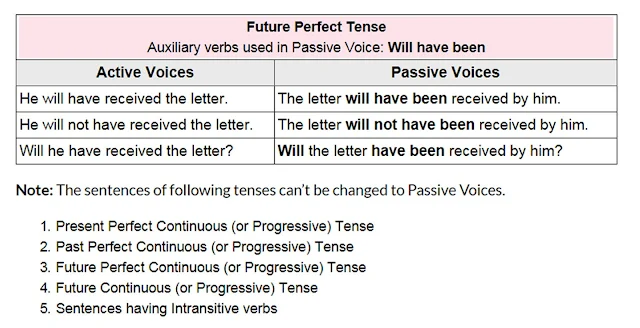Active and Passive Voice: Tense-wise Rules
Future perfect Tense
Future Perfect Tense
Normal structure of sentence in active voice for simple future tense is
Subject + will/shall have + V-3 + object. (Active Voice)
Ex: She will have cooked the food. (Active Voice)
(Here ‘she’ is subject, ‘cooked’ is V-3 (past participle) of cook and ‘the food’ is object.)
While changing the sentence into passive, this structure becomes
Subject + will have been + V-3 + by + agent. (Passive Voice)
Ex: The food will have been cooked by her. (Passive Voice)
(Here ‘The food’ becomes subject in passive voice, ‘cooked’ is V-3 (past participle) of cook, and ‘her’ is agent (doer))
See some more examples to clarify this
- Shubham will have written homework. (Active Voice)
Homework will have been written by Shubham. (Passive Voice)
- Simran will have learnt English. (Active Voice)
English will have been learnt by Simran. (Passive Voice)
- Sachin will have played cricket. (Active Voice)
Cricket will have been played by Sachin. (Passive Voice)
Future Tense with Going To
Normal structure of sentence in active voice for future tense with going to is
Subject + am/is/are + going to + verb + object. (Active Voice)
Ex: She is going to cook the food. (Active Voice)
(Here ‘she’ is subject, ‘cook’ is verb and ‘the food’ is object.)
While changing the sentence into passive, this structure becomes
Subject + am/is/are + going to + be + V3 + by + agent. (Passive Voice)
Ex: The food is going to be cooked by her. (Passive Voice)
(Here ‘The food’ becomes subject in passive voice, ‘cooked’ is V-3 (past participle) of cook, and ‘her’ is agent (doer))
See some more examples to clarify this
- Shubham is going to write homework. (Active Voice)
Homework is going to be written by Shubham. (Passive Voice)
- Simran is going to learn English. (Active Voice)
English is going to be learnt by Simran. (Passive Voice)
- Sachin is going to play cricket. (Active Voice)
Cricket is going to be played by Sachin. (Passive Voice)





















No comments:
Post a Comment